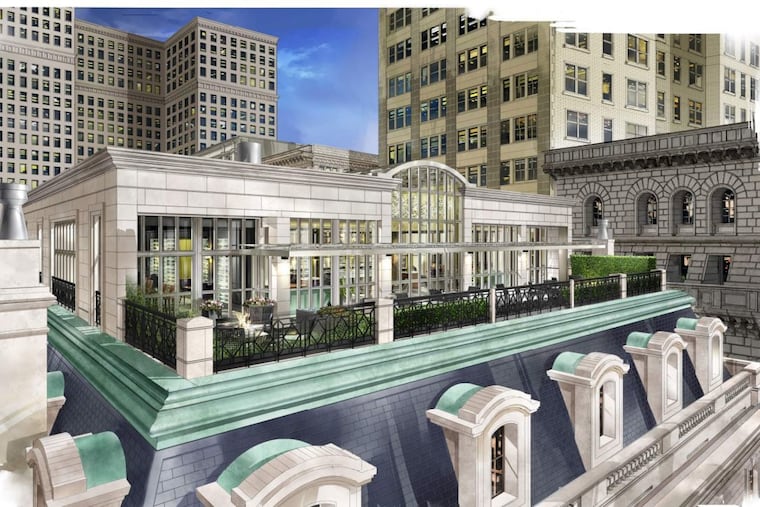Dinner at the Union League? No thanks.
I wouldn’t want to eat at any public restaurant that flaunts anti-gay, anti-immigrant or racist views. So why would I support an exclusive private club that lifts up such a voice?

At the end of December, the Union League announced plans to build a $25 million rooftop restaurant with an expansive terrace. Imagining the gorgeous city views from atop the elegant red brick bones of this ornate 1865 building, with breezy outdoor dining and a more casual dress code planned to debut later this year, I’d begun to think this grand addition to the city’s culinary skyline might be just the cue for me to finally write about the city’s reviving private club restaurant scene.
Or maybe not. This week’s gold medal celebration of Florida Governor and potential presidential candidate Ron DeSantis was a stark reminder that the Union League isn’t just a private social club with pretty good food: Its mission is served with an increasingly MAGA-flavored side of political ideology.
The 160-year-old club’s Republican roots — built to rally for its first gold medal recipient, Abraham Lincoln — were never the deterrent for me. My resistance to covering all private clubs has largely been because they are financially inaccessible to the wider public, with annual standard memberships, in the Union League’s case, in excess of $6,000, according to Billy Penn. (The private social dining clubs I have covered, like Palizzi or Messina, ring in at a much more egalitarian $25 dues.)
But it’s impossible to ignore the essential role food and restaurants have played in rebranding the fusty old Union League for the modern era. After decades of declining importance in the power dining scene, in no small part due to the rise of Walnut Street’s Restaurant Row and the city’s public restaurant boom in the 1990s and 2000s, the League used a major revamp of its dining program in 2008 to jumpstart growth among younger members.
The key was the hiring of former Four Seasons chef Martin Hamann, whose truffle-graced modern menus in the poshly revamped (and renamed) 1862 room became the closest thing one could find to the old Fountain Restaurant. With seasonally-inspired luxury plates, from lamb saddle with silky squash quenelles, to Hokkaido scallops and hand-cranked pasta, it signaled a bold refresh for an institution eager to leave its stodgy history of prime rib and chicken à la king in the past — along with its history of long-abandoned discrimination against Black people, women, and Jews.
Although I’m grateful the Union League still carries on dying Philly food traditions like snapper soup and fried oysters with chicken salad — a combination invented by African American cooks here during its early pro-Lincoln days — Hamann’s upgraded dining program has indeed spurred a growth in younger membership, many of them food-driven friends who’ve invited me along for a taste of “the new Union League.” The initiative has been so effective that every club expansion since has been built atop the lure of sophisticated dining, from the Bungalow in Stone Harbor, where, as a guest, I ate one of my most memorable al fresco dinners at the Shore, to an ambitious reimagination of the Guard House in Gladwyne.
It was abundantly clear as I wandered the portrait galleries of Republican legends in the oak-paneled halls of its Broad Street home during an extravagant wedding I attended years ago that this is a GOP shrine. But politics never intruded into the festivities — because great dining, in its purest form, is a nonpartisan pursuit. And the Union League’s hospitality pros throw a great party. But perhaps it all felt benign enough in the days of the second Bush and Obama presidencies.
Just as politics have become more polarized over the past six years, however, dining spaces have increasingly become the open crossroads for clashes over issues such as masking, vaccination requirements, and immigration policy. And few politicians have embraced the MAGA agenda on those fronts as much as DeSantis, whose inhumane and far-right wing policies include supporting the so-called Don’t Say Gay law, shipping unwitting migrant workers to Martha’s Vineyard, elevating election deniers, and blocking a new Advanced Placement course on African American studies in high schools.
It was concerning enough that more than 100 of the Union League’s own members wrote to leadership threatening resignations and warning that awarding DeSantis the club’s highest honor represented “a long-term reputational risk to the Union League.”
They’re right. I’d previously come to view the Union League as a venerable institution that saw the lure of great dining as a path forward into a more welcoming and inclusive future. But I wouldn’t want to eat at any public restaurant that flaunts anti-gay, anti-immigrant, or racist views. So why would I support an exclusive private club that recently lifted up just such a voice, essentially endorsing those sentiments? No helping of truffled gratin with the surf-’n-turf, or any $25 million rooftop view, can make it palatable enough to swallow.
Just as my colleague Jenice Armstrong recently declared in her column she never wants to be invited to another Union League event again, I’m happy to pass on any future meal invites, too. That $6,000 in annual club fees can go toward a lot of great dining elsewhere.